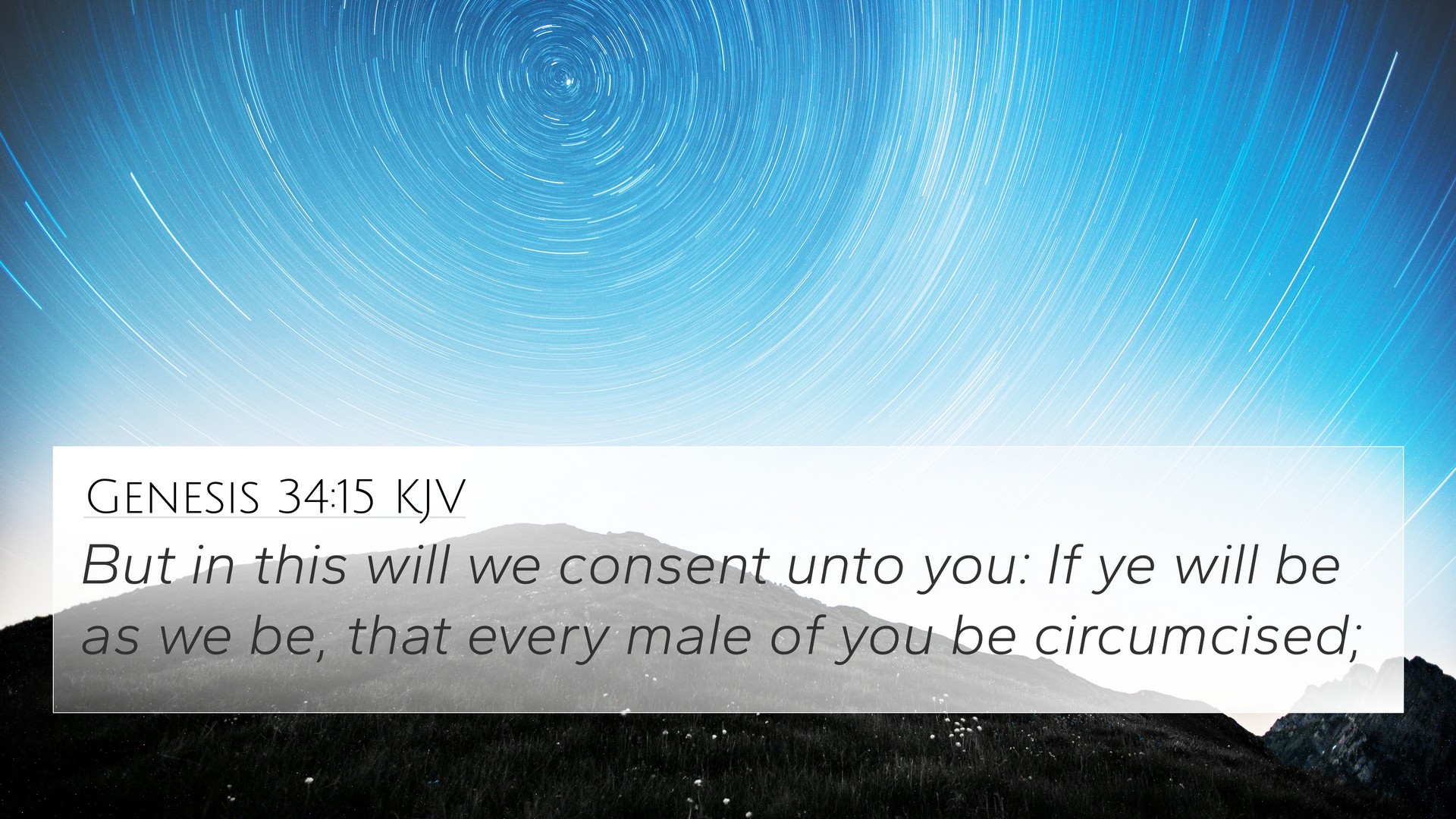Understanding Genesis 34:15
Genesis 34:15 reads: "But on this condition will we consent unto you: If you will be as we are, that every male of you be circumcised." This verse is part of a narrative involving Jacob's daughter, Dinah, and the Shechemites, revealing important themes of consent, covenant, and the cultural practices of the time.
Context and Overview
This verse springs from a larger context where Dinah has been defiled by Shechem, leading to a complex dialogue about family honor and cultural adherence between the Israelites and the Canaanites. The agreement made in Genesis 34:15 illustrates both the gravity of the situation and the negotiation of social norms.
Insights from Commentaries
This section synthesizes insights from prominent public domain commentaries:
- Matthew Henry: Henry highlights the tension between moral obligations and cultural practices, emphasizing how the sons of Jacob leverage this moment to assert their identity as God’s chosen people. This act of circumcision signifies a commitment to God’s covenant.
- Albert Barnes: Barnes notes the strategic aspect of Jacob’s sons in demanding circumcision. He discusses how this condition reflects both a physical and spiritual commitment, linking physical actions to covenant relationships.
- Adam Clarke: Clarke brings attention to the cultural implications of circumcision during that era, interpreting it as a marker of identity. He emphasizes the communal aspects of this practice, hinting at tribal alliances and enmity.
Thematic Connections
Genesis 34:15 opens up numerous thematic connections within the Biblical narrative:
- Covenant Practices: The demand for circumcision is heavily tied to the Abrahamic covenant, which highlights God's requirements for His people (Genesis 17:10-14).
- Consent and Authority: The necessity for consent illustrates the importance of mutual agreement in relationships, paralleling themes found in Matthew 18:19 regarding agreements among believers.
- Consequences of Sin: This narrative serves as a complex backdrop to the consequences of immorality, similar to what is recorded in Proverbs 5:3-6 about the allure of folly.
- Identity and Separation: The act of circumcision sets the Israelites apart from surrounding nations, a theme echoed in 1 Peter 2:9 about being a chosen generation.
- Negotiation and Deception: The sons of Jacob later use circumcision as a means to execute justice, which relates to Proverbs 26:24-26 that speaks of deceitful hearts.
Cross-References
For a deeper understanding, consider these cross-referenced verses:
- Genesis 17:10-14: God's command regarding circumcision as a sign of the covenant.
- Exodus 12:48: The significance of circumcision in the context of the Passover and inclusion in Israel.
- Luke 2:21: The New Testament reference to the practice of circumcision in Jesus' life.
- Acts 15:1-5: The early Church's debates around circumcision and the law.
- Romans 2:25-29: The discussion on the true circumcision of the heart versus the physical act.
- 1 Corinthians 7:18-19: Paul’s teachings on circumcision within the context of faith.
- Hebrews 13:4: The biblical view on marriage and sexual conduct as it relates to covenant faithfulness.
- 1 Peter 2:9: The description of believers as a ‘chosen people’, connecting to the theme of identity.
- Galatians 5:2-6: Paul’s assertion on circumcision and grace, highlighting the conflict between law and faith.
- Philippians 3:3: Emphasizes that true believers are the ones who have spiritual circumcision, contrasting physical practices.
Conclusion
Genesis 34:15 serves as a pivotal moment in the narrative of Jacob and his family, revealing themes of consent, cultural identity, and the practice of covenant. By examining the surrounding texts, this verse generates a deeper understanding of how the past informs the present concerning God's covenant people and their unique identity.
Resource Tools for Further Study
For those seeking to expand their understanding of this verse and its connections, employing cross-reference Bible study methods can be immensely helpful:
- Bible concordance: Useful for finding specific verses and their relationships.
- Bible cross-reference guide: An essential tool for those wanting to trace themes and connections between scriptures.
- Comprehensive Bible cross-reference materials: Supplementary texts that provide extensive cross-references.



